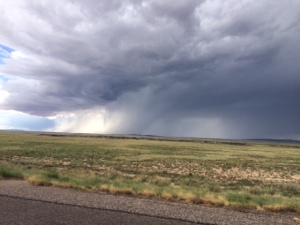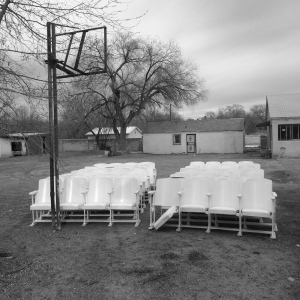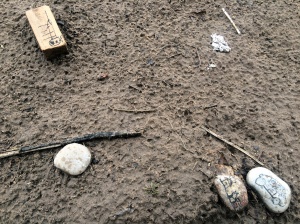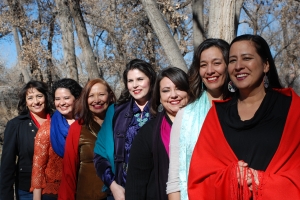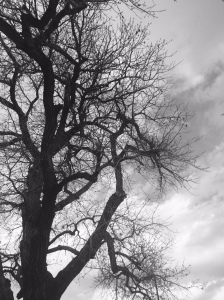Trigger Warning
Memory. Thirty-two years old. Most nights he sits on the window ledge outside my favorite bookstore. He never says hi to me. Never introduces himself. Each and every time I pass by, he stops what he’s doing and stares. He looks me up and down. The first several times I look away. Embarrassed. Then I remember my voice. I shout a greeting. He doesn’t speak. A few months in, I settle on stone cold silence. I will not look away. I will not speak. I will stare at him until he breaks.
I hate passing that bookstore.
Thirty-four years old. I am drinking a beer, taking a break from dancing. The bookstore man grabs my wrist and says, “let’s dance.” I say no. He pulls my arm toward the dance floor. I pull away, break free. “Leave me alone,” I say. He steps closer to me. My date, back from the bathroom, steps up to the man. He leaves. At the end of the night, the man apologizes to my date.
Memory. Nineteen years old. I stay on the bus eight blocks past my regular stop hoping the guy who’s been staring at me since Kendall Square will get off first. I stay on the bus because Harvard Square has more light, more people, restaurants and stores I can run into if I need help. It’s dark, late fall. I have to study. I always have to study.
I step off the bus and walk as fast as I can, past the pierced kids with pink hair and leather, past the bookstore and the burger place. I turn off Mass Ave onto the side street that leads to my dorm. The guy from the bus is half a block behind me. Maybe he’s a student. Maybe he’s going back to his dorm. But I know that he’s not, just like I know that I’m not a fast runner, that I should have put the mace my mom gave me in my purse, that I don’t really ever want to use the mace, just like I wouldn’t want to shoot someone.
I walk faster. He follows me. Three blocks from my dorm, I turn and face him. “What do you want?” I shout.
He takes a step back, hands in his jean pockets, head down. “Um. What’s your name?”
I shake my head.
He tells me I’m pretty.
“You have to go,” I tell him. “You can’t do things like that. You can’t follow someone.”
My seventh-grade art teacher talks about landscape, draws a tall letter m on the chalkboard and says, “You don’t want your mountains to look like Dolly Parton hills.”
In eighth grade, he’s my basketball coach. At the end of practice, he insists we dress like ladies the next day for our away game. I am thinking of my one nice skirt and blouse, how the material is thin, and I say I’ll be cold. He says, “Wear your wooly bra.”
I think the girls he touched must have told someone. They weren’t believed. He’s probably out of prison by now.
Thirty-four years old. I’m a guest author at a university, reading from my book. When I finish, a man raises his hand to ask a question. “Was what the Spaniards did to indigenous women during the Conquest sexual assault like you say, or was it simply diversification of the gene pool?”
Twenty-three years old. My friend and I ride a bus from Quetzaltenango to Antigua, Guatemala. We sit near two men from the U.S. They invite us to lunch. Over licuados and tamales wrapped in banana leaves, we chat about the volcanoes on the horizon. They warn us that hikers should use a trusted guide. Otherwise you could get robbed or raped. One says, “Well, you gotta pay extra for the rapes.”
Ten years old. A boy I liked in kindergarten tells the kids at his school that we spent the night together on an old mattress behind the gym.
Fifteen years old. Three boys I kind of know write me a letter saying what they want to do to my body, how they would f— me, how they’d want me to respond. They also send one to my best friend and another girl. I find one of them after school, hold the letter up to his face. “Gosh, we were just joking,” he says.
As the father of three daughters…
As a husband and father…
As the grandfather of two precious girls…
Remind me, how is this about you?
I am somebody.
I am somebody.
Thirty-one years old. I’m jogging near a school. Morning drop off. Kids walking with backpacks, busses pulling into the parking lot. I’m waiting for the light to change so I can cross the street. A guy pulls his blue sports car to the curb in front of me, lets the car idle. We make eye contact. He grabs his crotch and strokes.
Seventh grade. Eighth grade. Boys grab girls’ butts and snap their bras as we push through the patio doors back into the building after lunch. I am supposed to want this; it means I am pretty, I am “good.” That’s their word for it, for having a nice butt and not being fat. I am anxious, anticipating a hand. It happens. Again and again. I turn around only once. Three boys I’ve never met stand behind me, giggling.
College. I ride the subway back to campus from tutoring in the city. A man crosses the train car and stands right in front of me, facing me, holding onto the metal bar. The fabric on his thermals or running tights or leggings is flesh colored, threadbare. I can see the outline of his penis, which seems to hang down to his knee. He stares at me and rubs his crotch against the bar.
When I read from my book or give a talk about the years I spent in Oaxaca, someone almost always asks about the machismo in Mexico. “Was it hard to deal with that?”
Twenty-five years old. My roommate, a friend, and I walk her lab mix on a trail through the bosque. The afternoon silence is shattered by a woman’s screams. The dog breaks away, runs toward the screams and stops. Hair stands on the back of her neck. Teeth bared. I yell out, “Hello? Hello?” My roommate calls, “Are you okay? Is someone there?” Silence. My roommate grabs the dog’s leash. We run to the car. The friend says we’re overreacting, asks, “Are you sure you heard a scream?”
Are you sure that’s what he did / what he meant / what you heard / what you saw?
Every time the maintenance man at my old building worked on my apartment, he asked if I was married, if I had a boyfriend. He took hours to fix two broken tiles between my bathroom and kitchen, stopped his work to say, “Usted es guapa, pero muy guapa.” I lived alone. He had a key.
Thirty-four years old. A writer’s conference. I run into a man I once dated. He’s in a group of other men, all suited and older and accomplished. He and I exchange a quick hug. I’m in a hurry, on my way to a panel. A man from the circle, someone my father’s age, someone I’ve never seen, holds his arms open to me and asks, “Why does he get a hug?”
Thirty-three years old. The zócalo in Veracruz.
“Can you tell me where the Palacio Municipal is?”
“No, I’m not from here.” As soon as the words are out of my mouth, I want to pull them back.
“Maybe I could show you around. Can I buy you a drink?”
The next night I see him pull the same trick on another woman.
Forty-four years old. Walking an unfamiliar city with a colleague from home. He asks if I’ve been here before.
“No. Never.”
“You walk like you know exactly where you’re going.”
Even when I’m lost I walk like that.
The building manager at my last apartment gives me a tour of the property. Each unit is assigned a storage area in the basement. He says, “Some people put their bikes down here, or extra furniture. You might wanna lock up your boyfriend. Sometimes we like cages.” Months later when the shower leaks onto the floor, I call him to fix it. “I don’t know what you might be doing to cause that,” he says. “I mean, I’ve never showered with you.” I stop calling.
Five years old. I visit a friend. We play in her room. Her uncle is in town. He sits on her bed, asks if she thinks I’d like to play that game he taught her. She shrugs her shoulders. He tells me to hold his thumb and close my eyes. When I open them, his thing is in my hand. He laughs. When I tell my brother, he says I should never play there again.
I hate the question posed to men who practice non-violence: If your wife or daughter were being raped, would you use violence to protect her?
My best friend from high school runs into a kid we knew from band. When he asks about me, she says I am in Belize doing a Catholic volunteer program. He mistakes this for missionary work, thinks I’m on my way to becoming a nun. He tells my friend, “What Michelle really needs is a good f—.”
I worried I wouldn’t have enough to write this post.
Lonely man on the train.
Lonely man on the plane.
Lonely man at the coffee shop.
I’m reading, studying, staring out the window, writing, thinking, daydreaming, planning, plotting, reflecting, resting.
I don’t want to talk.
I don’t want to smile.
Unless I do.
And then I will.
Back from the grocery store at our neighbor’s Saturday morning brunch, I tell my friends about the man in the parking lot who followed me to my car. “He was creepy.”
My neighbor dries his hands on his apron and says, “You think everything’s creepy.”
What did you expect to happen?
Thirty-something. Raggaeton on the jukebox. I sway my hips while the bartender pours my beer. Behind me, a table of men claps to the beat, chants “Hey, Hey, Hey,” in rhythm with my hips. I stop swaying. They stop chanting. I start. They start. I stop. They stop. I turn around. They applaud. I grab my beer and find a table in the other room.
I am afraid sometimes, and I don’t want to be.
I walk my roommate’s pit bull mix on a North Valley acequia trail. I sense someone behind me. A man in jeans lunges toward me and gropes my thigh.
It’s been almost twenty years. Massage. EMDR. Therapy. Meditation. And still, when I feel threatened, that part of my leg throbs.
Twenty-nine years old. Old Town, Albuquerque. I come face to face with a burglar in the house I’m renting. I scream him out the door. He trips and falls, and I don’t stop screaming until he is gone.
My boyfriend says, “I don’t like you living here. You need to move somewhere safer.”
Where is that place?
Stranger in a downtown bar caresses my face.
I fall asleep on the bus from Belize City to Punta Gorda. The driver wakes me by massaging my hip.
A woman in a café is trying to read. Some guy won’t leave her alone.
The girl I am raising. Seventh grade. A boy sticks his hand down her shirt.
I tell her, “I will always believe you.”
I thought I wouldn’t have enough to write about.
Shall I go on?
It’s a lot to take in.
You must be tired.
Yeah, me too.

